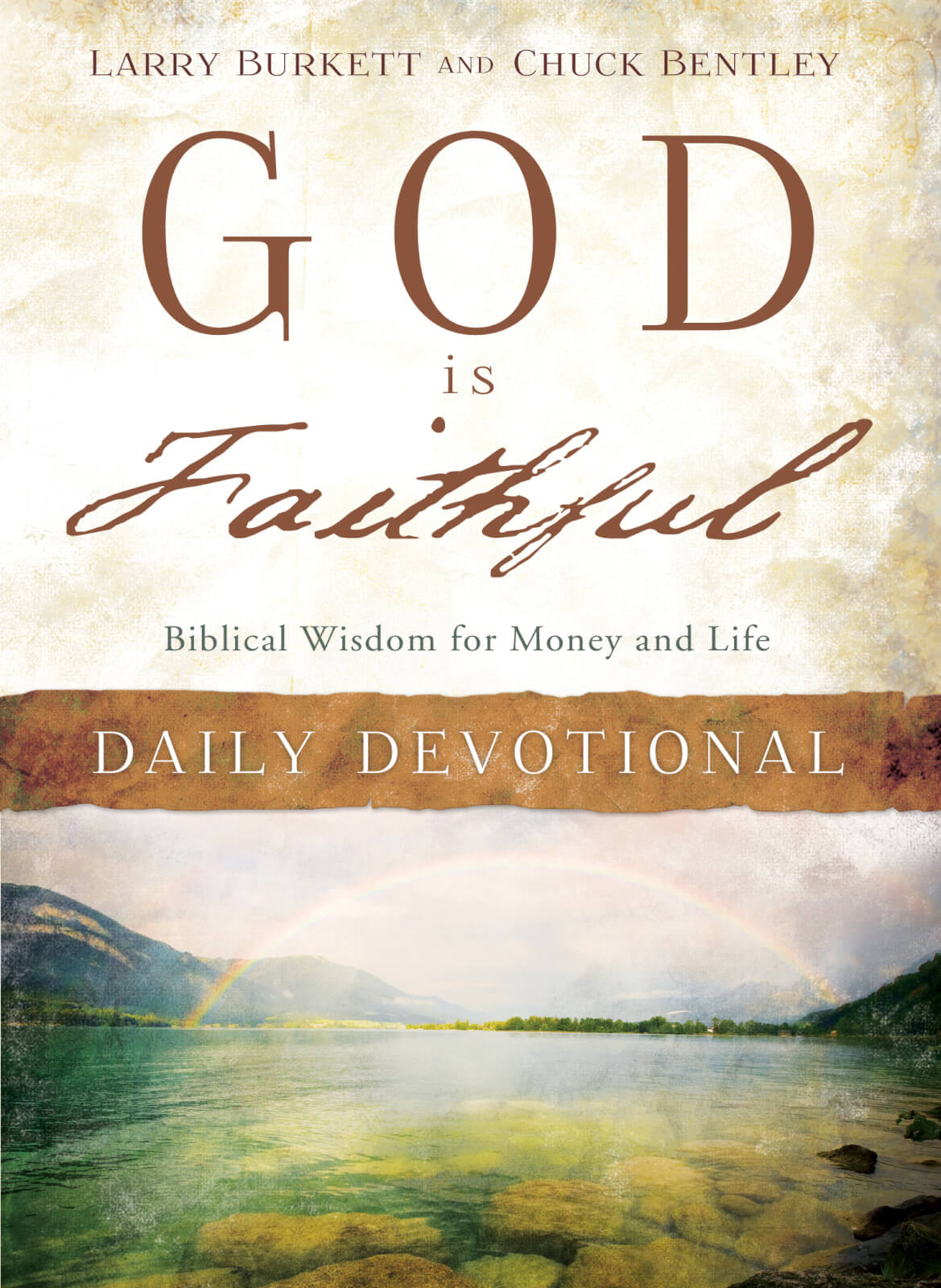365-DAILY DEVOTIONAL FROM LARRY BURKETT AND CHUCK BENTLEY
SIGNUP TO RECEIVE YOUR YOUR DAILY DEVOTIONAL

Privacy Policy: We hate SPAM and promise to keep your email address safe.
“Time is money.”
How true this is!
Time is also a gift. In fact, it’s the most valuable resource you and I will ever have. The way we use it will influence our earning potential, the way we spend our money, the quality of our relationships, and our overall health.
Time is also the ultimate equalizer – no matter who you are or where you were born, you have the exact same 24 hours each day and the freedom to decide how you’re going to use them.
I was recently listening to a podcast featuring best-selling author and speaker, Rory Vaden as a guest. Rory explained why the idea of “time management” is so dangerous – because time is impossible to manage. You can only manage yourself. Time will keep going, whether or not you’re paying attention, so instead of trying to manage it, we should focus on maximizing it.

The simplicity of this truth struck me, because it transfers the ownership of my day-to-day schedule from time to me. I can never be a victim of “busyness” or a “crowded schedule” because I have allowed, granted access to, every single item on my calendar. Time didn’t overbook my day. I did.
The significance of our responsibility to use our time well increases as believers in Christ. If time is our most valuable resource, and God has given us the freedom to use it however we want, then time, more than anything, should be subject to Christ. How contradictory for me to surrender my paycheck to Kingdom purposes, but not the way I spend my day. You could easily liken it to the Parable of the Talents – two men used the resources they were given wisely and multiplied their money. One man hoarded it and was punished. While we can’t multiply time itself, how we use it will determine our multiplication elsewhere.
When the stewardship of our time and money work together, our potential for the Kingdom increases exponentially.
Much of this is due to the fact that time and money have such a close, and correlated relationship. When an employee uses his time wisely and productively, he becomes a better employee and may receive a raise, promotion, or new career opportunities. When a mom uses her time throughout the week wisely to plan, budget, and organize, she saves money at the grocery store, reduces her stress, and increases her resourcefulness. The better you steward your time, the more money you can earn. And the better you steward your time, the more money you can save.
The inverse is also very true – the more time you waste, the faster your earning potential decreases and the more money you waste. In fact, sometimes poor use of your time can cost you significantly more than overspending would.
The Bible talks extensively about using our time well – Proverbs reminds us to ask the Lord “To teach us to number our days so that we may gain a heart of wisdom.” Guarding our hearts and minds has a significant influence on how we spend our time, and money.
More than anything, we should steward our time wisely in order to serve God. But many of us are too busy….sometimes, we are too busy doing things for God that we neglect to do the things of God.
Decide to be the best user-of-time you can be. As you work your budget, improve your savings strategy, and increase your giving, pray for wisdom on how to increase your productivity as well. Honor God in the way you do your job, take care of your house, and interact with others. Just like making a budget forces you to cut the excess out, organizing your time will force you to make disciplined sacrifices as well. It may mean waking up an extra 15 minutes early in the morning or deleting Facebook off your phone, but we pray it will be encouraging to you.
One way to learn how to live every day as a good steward and use your time well is with Crown’s online MoneyLife Personal Finance Study. It has just 7 lessons and is completely self-paced so you can fit it into your newly improved schedule. It’s both practical and biblical and will help you take the next steps towards finding freedom in your finances.
You’ll find how applying practical, biblical principles can transform your finances…and every area of your life. Chuck and Larry deliver hope to you and your family in this inspirational collection of 365-daily devotionals. Learn to be a wise steward of your resources and discover biblical insights for giving, debt, money, and investing.

The fundamentals of budgeting are simple – know where your money is going so it serves you, not the other way around. When you have your finances in order, you are better able to be used by God to accomplish great things for the Kingdom, and keeping a budget is the best way to do that.
The envelope system is perhaps the most simple, tested-and-true way to track your spending because it doesn’t require anything more than a few envelopes. Crown’s Founder, Larry Burkett, pioneered the envelope system years ago and it still works just as effectively because it helps you literally see where your money is going.

Since there are so many options for digital methods of payment now, relying on cash alone for purchases will help you save. But if you take it one step further and divide this cash into specific, intentional categories, then you’re well on your way to reaching your goals and living in freedom.
The first step is to build your budget.
You’ll need to:
Whenever you receive your paycheck, go to the bank and withdraw cash. You don’t have to pay cash for your fixed expenses, like your mortgage, rent, or insurance. Instead, we suggest that you cash out all variable categories that will involve you making purchases – shopping, groceries, eating out, getting coffee or treats, buying gifts, any entertainment or recreation, etc.
Designate an envelope for each of these categories and write the name of the category, along with the allocated amount, on it.
Carry these envelopes with you wherever you go. Whenever you go to make a purchase, take the exact amount out of the appropriate category to pay. Once you run out of cash in one envelope, you can’t spend anymore.
There are several apps that function like the envelope system on your phone. You can connect your bank account and it allows you to assign each purchase to a digital category. While this system works great, we still encourage you to use cash for a large part of your budget, especially in the areas you overspend. Credit or debit cards don’t connect your emotions to your purchases the same way that cash does, so using them will always make it easier for you to overspend.
If you want an easy-to-follow guide for your finances, download the free Money Map. You’ll already be off to a great start with your budget and envelope system!
Try setting up some accountability to keep you on the right track, and let us know how you’re doing!
As Americans, we have developed somewhat of a mania about retirement. Much of that is due to the fact that people are not prepared:
But the truth about retirement has been confused – our culture has twisted retirement to be something we “deserve” by the time we reach age 65. There’s a shared attitude that a beach house in Florida should be our reward for all the work we’ve done in our lifetime…but the opposite is true. Work is our reward. In fact, it’s a blessing from the Lord. We know this because God gave work to Adam before sin entered the world, meaning it was always part of God’s plan for His people. It keeps our bodies active, our minds sharp, and increases our lifespan.

On the same token, God’s Word does not prohibit, but rather encourages, saving for retirement. As Christians, we prepare for our later years so that we can take care of ourselves when we are no longer physically able to work full time and to position ourselves to be free to serve full time.
Stewards save because we trust the Lord, not because we trust money. So when it comes to retirement, remember that you are saving to be used by God, not to spend frivolously. Remember that He is “able to make all grace abound to you so that always having all sufficiency in everything, you may have an abundance for every good deed” (2 Corinthians 9:8).
There are many different retirement plans, and there is not one “best” plan that is guaranteed to work for everyone, so know your options. It is important to educate yourself and seek wise counsel when considering how to save for retirement.
Like it says in Proverbs 24:3-4, “By wisdom a house is built, and by understanding it is established; and by knowledge the rooms are filled with all precious and pleasant riches.”
Always seek the Lord on your savings strategy, and continue to understand wise savings methods and practices. Don’t allow confusion to intimidate or deter you from starting to save – do your research and ask questions!
Start saving as early as possible, especially if your employer offers a matching contribution to your 401(k) or 403(b). Don’t miss out on “free money”! And if you’re self-employed or don’t have access to an employer-sponsored retirement savings plan, be diligent about creating your own plan and saving early. This blog outlines several different options for you.
To illustrate the difference of starting to save for retirement early, look at this example:
If Sally Sue saves just $200 a month starting at age 20, with an 8% interest rate, she will have over $1 million saved by age 65.
But if Sally Sue waits and saves $200 a month starting at age 40, with the same 8% interest rate, she won’t even have $500,00 by age 65.
This is the perfect example of Proverbs 21:5 – “Steady plodding brings prosperity…”
So remember that when it comes to retirement, time is on your side – start early, diversify your investments, and remember Proverbs 6:6-8– “Go to the ant, you sluggard; consider its ways and be wise! It has no commander, no overseer or ruler, yet it stores its provisions in summer and gathers its food at harvest.”
Since the rules on retirement have changed, consider postponing the age of retirement as late as your health will allow. Plan to always work or volunteer in some capacity after retiring to keep your health.
Many people have actually launched new, or “encore” careers at retirement age since they have more cash, decades of experience, and less risk. Your usefulness and expertise does not decline at age 65, so don’t let anyone deter you from working or fulfilling a lifelong business idea. Seek the Lord’s guidance and enjoy a long, happy life.
Many feel that their credit card debt prevents them from saving for retirement. If that’s you, get it under control now! First, stop using your cards and make a plan to pay them off as soon as possible. Try the debt snowball calculator – it’s easy and FREE! If you need a little more help, Christian Credit Counselors are a great resource. They’ll get you started with a free debt analysis and work with you to pay off your cards quickly and with less interest. They’ve been our trusted partners for years and have a wonderful team of friendly, professional counselors ready to help you.
Did you know that tracking your spending and creating a budget can be freeing and actually bring peace?
A budget empowers you to know exactly where your money is going and helps you reach your financial goals. When you use a budget, your money starts working for you, not the other way around. Contrary to popular opinion, it doesn’t limit your spending, it gives you freedom to spend…the right way.

The Bible is full of examples of the importance of planning. God gave His people a detailed plan for building the tabernacle, the ark, and the temple. He also gave detailed laws that the Israelites were to follow while living in the Promised Land. Jesus, in Luke 14, talks about how foolish a man is who wants to build a tower but doesn’t first sit down and count the costs, who does not make a plan.
A budget is simply a plan for how to spend the money we have. As Christians, we recognize that everything we have is a gift from God. We are not the owners; we are simply the managers of what He has entrusted to us. Knowing this should give us a better perspective on handling money. A budget is a great way to make sure we are being faithful.
Here are some simple steps to get you started:
For variable income, use an average of the past 6-12 months as your base income. If you want to take a more conservative route, work your budget off of the lowest month you’ve had in the last year and save any extra.
To get an accurate idea of how much you spend every month, track your purchases for 30 days. Use an app, check your bank account, save your receipts, and write down every dollar you spend.
Assign amounts to each category based off of your spending log.
Look at your income, look at your expenses, and compare. Your income – your expenses should = $0. Keep adjusting until it does.
TIP: have a miscellaneous category for those random expenses that come up and put any extra money in this category to get down to $0. We know that starting a budget can be a little overwhelming, so we put together the Easy Guide to a Budget You Love to make it easy for you.
Everyone likes to keep track of their budget a little differently – you can use apps, a spreadsheet, or envelopes. Find a system that works for you and stick with it.
Your budget should be your visual guide to how you spend your money and where you have freedom to spend. Set goals to work towards – the Money Map is a great guide to help you know which goals you should work to reach next. Keep revisiting your budget to adjust as you need (about every 6 months) to keep it accurate and meet your goals faster.
No matter what, remember that your budget will never work unless you work your budget. The saying, “those who fail to plan are planning to fail” definitely applies to the area of personal finance. Once you have one made, stick to it! Proverbs 16 says, “Commit to the Lord whatever you do, and he will establish your plans.”
Are you attending any weddings this summer? It’s the height of wedding season right now, which can get expensive quickly.
And if you are paying for travel costs, a hotel, possibly a new outfit, and a gift, the cost of attending a wedding can skyrocket. In fact, according to Consumer Affairs, the average American will spend over $700 just to attend a wedding. That price is likely to increase if you’re in the wedding or a Millennial.

So how do you still make an effort to give thoughtful and useful gifts without ruining your own budget in the process? We’ve compiled some of our favorite wedding (and shower) gifts that are under $30, as well as some “gift hacks” to help you make it through the summer.

We hope that your summer is filled with quality time spent with friends and family! What are you doing this summer? Share your budget-friendly vacations, activities, and gifts with us!
What do you think of when you hear the word, steward?
There are many misconceptions of what stewardship means – fundraising campaigns at church, recycling, and getting out of debt are common examples.
But none of these fully encompass what stewardship really means.
Stewardship is not ordering your finances in a way that you can spend whatever you want. It’s ordering your life in such a way that God can spend you however He wants.

Jesus did not die on the cross so we could live a life in pursuit of health, wealth, entertainment, and vanity. He died on the cross to stake His claim as owner of our lives. You and I were bought with a price – and we are called to build the Kingdom of God, not our own.
The best way to start thinking like a steward is to recognize that you are not the owner of anything. God owns it all and has entrusted resources, time, talent, and people to you for you to manage. As His manager, your role is to be faithful to His purposes. Regardless if you have a lot or a little, you must seek to allow God to have total control over your financial choices.
Galatians 2:20 reminds us of this, “I have been crucified with Christ and I no longer live, but Christ lives in me. The life I now live in the body, I live by faith in the Son of God, who loved me and gave himself for me.”
Our ambition and life pursuit should be to become rich towards God, not in the eyes of men. Then you can one day hear, “Well done, good and faithful servant…” (Matthew 25:21)
As you embark on your journey to faithful stewardship, ask yourself these questions:
If you want to learn more about what faithful stewardship really means, enroll in the online MoneyLife Personal Finance Study. It’s a seven-week course that will help you overcome financial challenges to gain a life of meaning and purpose.
Do you have $1,000 in a savings account that you could access right now?
Most Americans (70%) don’t. In fact, six out of 10 Americans couldn’t even access $500 in an emergency. And 34% of Americans said they don’t have any savings…at all.
A lack of savings is the #1 reason people accumulate debt – because when you don’t have the cash to pay for something, you begin relying on credit cards.
But as followers of Christ, we are called to live differently. God wants us to be savers – He wants us to have extra resources to take care of our families, position ourselves to serve Him (with our money and time), and to look to Him as the sole provider of our needs, not creditors, or family and friends.
Proverbs 6:6-8 encourages us to learn our savings habits from the lowly ant: “Go to the ant, you sluggard; consider its ways and be wise! It has no commander, no overseer or ruler, yet it stores its provisions in summer and gathers its food at harvest.”
So be encouraged! If you don’t have a savings habit, today is the day to change that.
You’ll want this money to be available to you immediately without penalty or cost for withdrawals. Some banks require a certain amount to deposit upon opening the account. Try to have your savings account at the same bank as your checking account so you can easily transfer money into your savings.
Somewhere between 1-10% of your total income (before taxes are taken out) should go straight into a savings account. You can elect to use automatic deductions taken from your paycheck. Once you’ve reached your first goal of $1,000, continue to save from your income as you work towards your next goal.
Here are more great ideas to help you build your emergency savings account or boost an existing savings nest:
Increase your income – obviously, if you are making more money, you can save more money also! Try adding some overtime for a period, look for odd jobs online, use apps to make money, consider getting your CDL to drive school buses, work extra hours for UPS or FedEx, or become an Uber driver. Whatever you decide, do your research and pray for discernment.
Cut cable/netflix – that extra $10-$150 a month could be a fast way to grow your savings. Read, work more, or spend more time outside instead.
Downgrade phone plan – this probably isn’t an option if you signed a contract with your service provider, but you should consider getting a more basic phone plan if possible.
Adjust thermostat – this can save you dollars and cents here and there, which can add up to major savings.
Use cash only – it’s been proven over and over that using cash to pay for things will help you spend less. Try using cash only for groceries, eating out, and all shopping.
Save every $5 – once you are on your all-cash budget, save every single $5 bill you touch. One woman did this for 12 years and saved $36,000!
Automate – aside from automating savings from your paycheck, check out apps that help you save spare change. Ask your bank if they have an option to round up every purchase you make to save the difference (you save 35 cents on a purchase that cost you $10.65). Like Proverbs says, “steady plodding brings prosperity”!
Sell what you don’t need – have a big garage sale or get into the habit of consigning. Your trash may be someone else’s treasure!

Bring your coffee – I don’t have to tell you how much a $5 drink at Starbucks every day will cost you each year (okay, I will….it’s $1,825). Make it at home or skip it altogether.
Plan your meals and make a grocery list – meal planning is a great way to save money. Plan inexpensive meals that you can prep early in the week and eat for lunch the next day. Make a list every time you go to the grocery store and never shop hungry.
Pack your lunch – even more costly than the daily Starbucks is the daily desk lunch. Brown bag it Monday – Friday and save close to $2,400 a year.
Skip the gym membership – try taking up running or walking (especially for the summer) so you can skip that expensive gym membership.
Save every bonus, extra income check, and tax return.
Download the Money Map – this is a free guide to living in freedom with your finances. It has step-by-step goals to help keep you on track and encourage you. In fact, the first step is to save $1,000! You can download it for free here.
Hopefully these tips help you as you journey to financial freedom by saving. What are your favorite saving tips? Share with us on Facebook!
Father’s Day is less than a week away! This Sunday we will be celebrating all the wonderful dads in our lives, likely in the form of backyard grilling and ESPN. If you don’t have a gift for dad yet, here are some great, budget-friendly, suggestions:

No matter who or how you are celebrating Father’s day, remember our one true Father and the sacrifice He made by giving us His one and only Son.
“We have seen his glory, the glory of the one and only Son, who came from the Father, full of grace and truth.” – John 1:14
It’s been said that paying off debt is like eating an elephant – it can only be done one bite at a time.
But getting started can seem daunting and overwhelming. Knowing how to take the first bite can prevent many from starting altogether.
Of all the people I know who have gotten out of debt, not one of them has regretted it. Living debt-free gives us so much freedom, because God never intended for borrowing to be used as a routine part of our financial planning. Proverbs 22:7 tells us, “The rich rule over the poor, and the borrower is slave to the lender.”

So let me help you take the first bites of that elephant and pay off your debt. Once you get going, you can see the progress you’ve made and continue to make more.
This may seem counterintuitive because it seems more logical to put all the money you have towards your debt to get rid of it faster.
Wrong.
Think about the reason you got into debt in the first place – you didn’t have enough cash to fund that summer vacation…you weren’t expecting that expensive ride in the ambulance…you went to college.
So before you take the offense to pay off your debts, build up your defense with a savings account. If you have at least $1,000 put aside to be used for emergencies only, then you’ll be a lot less likely to go into debt (or add to your existing debt) in the first place. Here are 13 ways to save for your emergency fund and 8 budget hacks to help you save even more.
When it comes to debt, the saying is true: “If you fail to plan, you are planning to fail.”
The Debt Snowball Method is the best way to pay off debt quickly and save on interest.
Here’s how it works:
You start by paying off your smallest debt as quickly as possible. This frees up extra money to put towards the next debt and gives you a boost in motivation.
Then, you put all the money you were paying on that smallest debt and put it towards the next smallest. So on and so on until you, my friend, are DEBT-FREE.
Here’s how you start:
Keep in mind that every worthwhile goal you attempt will likely be met with resistance and obstacles. Pray and ask God to give you patience, endurance, and a faith that will not stop until you are debt-free. Proverbs 21:5 says, “Steady plodding brings prosperity.”
And if you’re feeling overwhelmed by the burden of credit card debt, get in touch with Christian Credit Counselors. They’ve been our trusted partners for years and can help you consolidate your accounts, lower your interest rates, and negotiate on your behalf.
Share your journey to freedom with us by liking us on Facebook.
Notifications